Shine A Light
 04.27.2011
04.27.2011 
We ventured so far into the inner world in the past two posts that I’d like to focus on something external this time, like, say, a list of differences between life in France and life in America. And why not present the list in the context of the vision quest? Those twelve sea creatures metamorphosed into variants of the Greek gods and goddesses, each with their own realm of action, so let’s look at the French and Americans through the eyes of the “invisibles.”
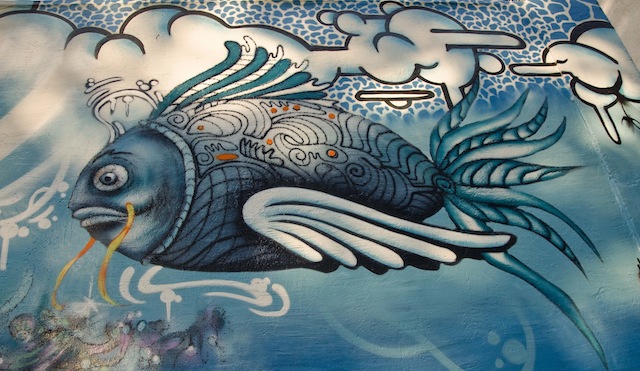
Any such list is entirely subjective, of course, coming as it does from our limited experience of living off and on for three weeks to three months at a time since the ‘80s and now as permanent residents of Paris for a mere three months. But here are a few things that Richard and I have noticed:
Poseidon (sleep, dreams, the Collective Unconscious)
We live in a stone building that was built in 1862. Our apartment is on the fifth floor and looks out onto two courtyards. We have three fireplaces, none of which work but which look good, especially the salamander in the dining room, and herringbone parquet wooden floors that creak when we walk but which we wouldn’t change for the world.
 A salamander
A salamander
At night, if you lean out the window far enough, you can see the lights of every one of the twenty apartments in the two wings of our building. I am knocked out by the discipline of the French in relationship to sleep. By 11 p.m., almost every window is dark. By midnight, everyone has gone to sleep, including Richard and me…unless we are writing or editing photographs or studying French or we just got back from dinner with friends and are a bit too wired to sleep yet.
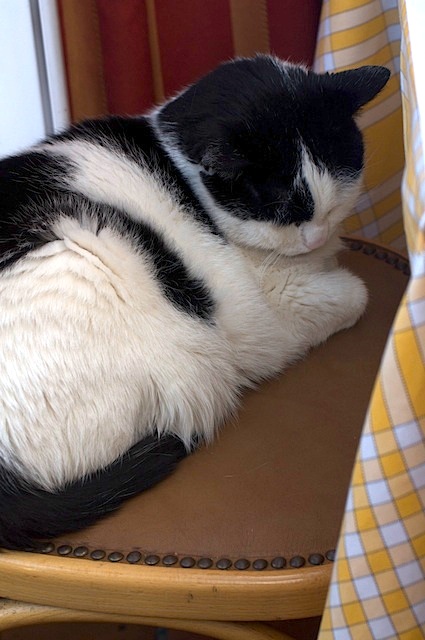 Beaujolais, the house cat at Rotisserie Beaujolais
Beaujolais, the house cat at Rotisserie Beaujolais
The French are our model for good sleep habits. They are Benjamin Franklin’s delight, “Early to bed, early to rise….” But we don’t always follow this model.
Dionysus (passion, desire, silence, the Personal Unconscious)

I’m going to get in trouble here, but here goes: We keep running into examples of the French notion that marriage and passion don’t go together. According to our French friends, mistresses and side men are rife, for both sexes. It seems to me that Americans place more value on fidelity in marriage than the French do. My advice to American women who are considering moving to France: find an American mate first, and move here together.
On the other hand, silence: we could write a book about the different public attitudes about noise in the U.S. and in France. It is shocking to sit in a restaurant surrounded by French couples or groups of friends who modulate their voices so that everyone in the room can have a private conversation; then a couple of Americans sit down and the shouting begins.
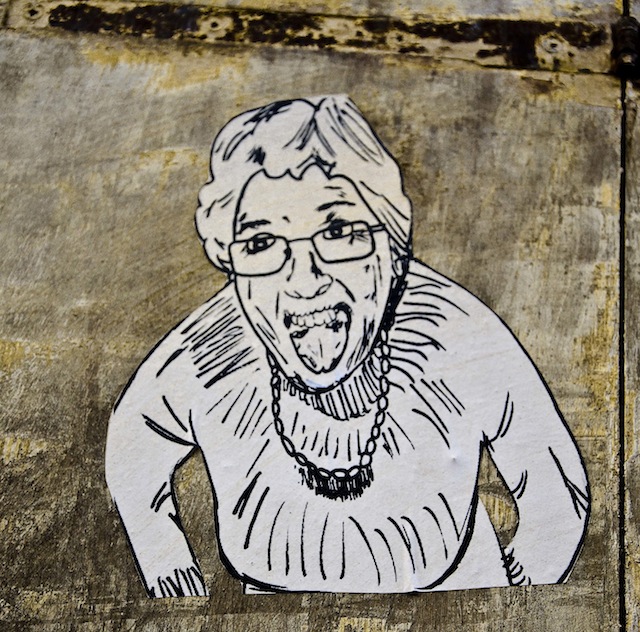
Or you fly back to the U.S. and land in NYC or Dallas-Fort Worth and before you’ve even reached customs, a TV overhead is blaring news or some inane reality show.
The relationship to silence seems to me to reveal something about a culture’s embrace of, or fear of, the soul. You cannot hear the voice (or voices) of the soul in the midst of a constant barrage of noise. Creativity begins in the soul.
And the French have a tremendous respect for creativity.
Artemis (emotional security, cleanliness)
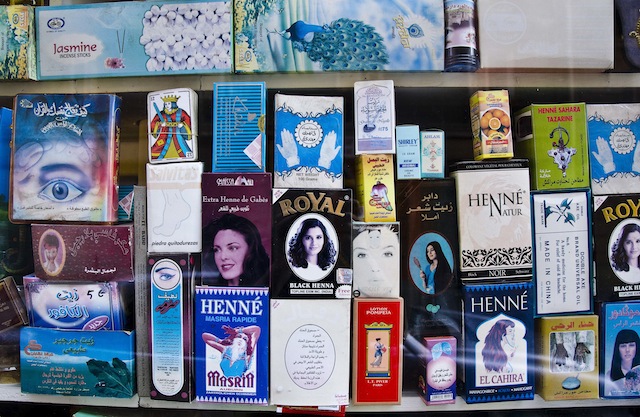
Let’s just talk about showers. American showers are better, the plumbing is better, since it’s not hundreds of years old, the water has less calcium and it makes for less fly-away hair.
Then there’s toilet paper. Over the years, we’ve laughed at stories we’ve heard of people who bring a suitcase of their own, but it’s true, if you want sandpaper, go into any French bathroom.
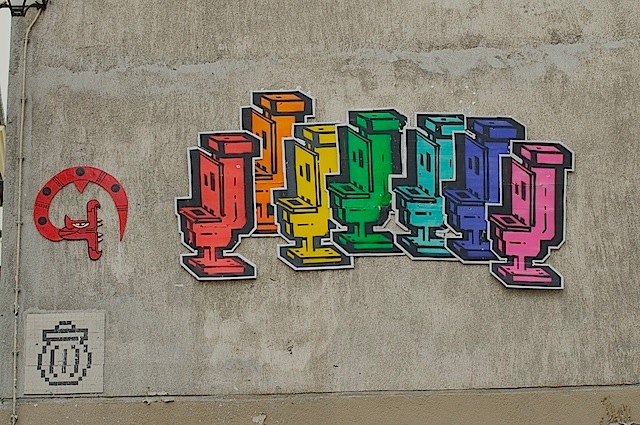
I can’t speak about emotional security except one by one, within individuals. And I don’t know enough French individuals to say.
Hermes (education, reading, inspiration)
A friend just sent me an Internet link that compares how many independent bookstores there are in New York City to ones in Paris. The difference is staggering: something like 1400 in Paris versus about 18 in New York City. I’m not surprised. You can’t go for more than a few blocks in Paris without running into a bookstore.
“If you don't listen to the Guardian Books podcast, I recommend it. It's free. Regarding Montaigne, the podcast in Paris also distinguished the French, in contrast to the Brits and Americans, for loving and publishing essays, liking to read about ideas.”
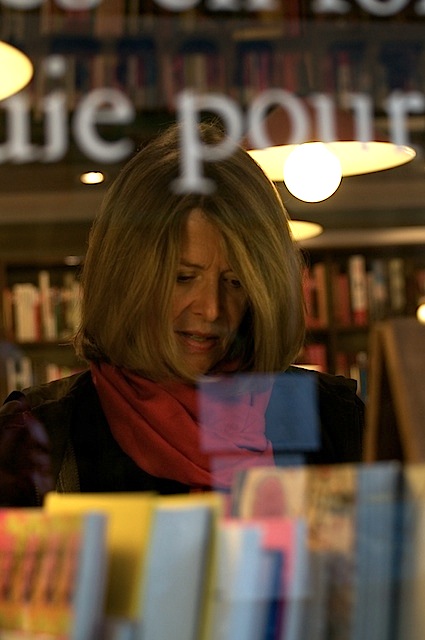
Richard and I watch French TV for an hour a night, as one of our French lessons. It’s striking how many shows have intelligent debate about books, literature and ideas, and how few dumb sitcoms and idiot reality shows and dancing with celebrities there are. Our acupuncturist here told us how the American CBS series 60 Minutes did a long, admiring piece about the highest-rated show (at the time) on French television, an hour-long, prime-time Sunday night talk show called Apostrophes, which featured interviews with writers the caliber of Marguerite Duras and André Malraux. The show Apostrophes still has its own definition in the Larousse dictionary.
Daedalus (creativity, art, craft)
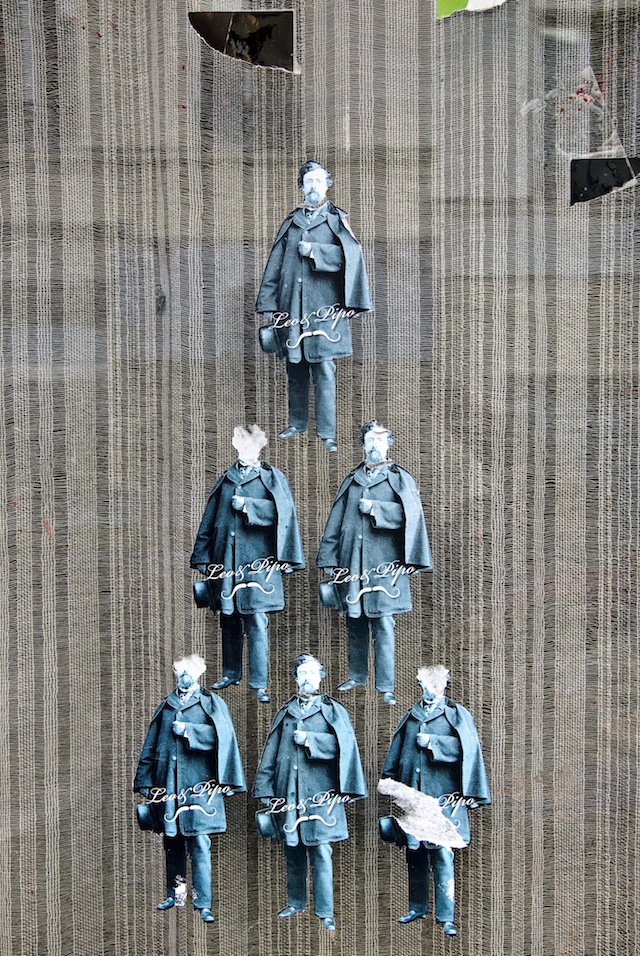
In this realm, there is something that is so striking about Paris that it might be half the reason we moved here: the street signs. You can’t go more than a block without reading some plaque on the wall that honors a poet, a novelist, a photographer, a sculptor, an architect, a scientist, a doctor, a philosopher. Often it is where that artist or inventor was born, or only lived for a year.

On our short street alone, there is a plaque at #74, where Hemingway and his first wife, Hadley, lived; a plaque at the town house, #71, where Joyce finished Ulysses in the apartment which was loaned to him by Valéry Larbaud, poet, novelist, essayist and translator; a plaque at #67 for the philosopher, Blaise Pascal, who died there in 1662; a plaque for Jacques-Henri Lartigues, the photographer and painter; and at #2, where the poet, Verlaine, lived for a time. Creative people are respected and honored in this city. Perhaps that’s why so many have lived here. You can feel it in the stones, in the buildings and in the streets.

Athena (government, management, money, peace)
It’s inevitable that a country such as France, which has known so many wars on its own soil, would be more cautious than the U.S. about invading other countries for imperialistic aims, whether to gain resources or territory (in the name of democracy, bien sûr). The U.S. is too young a nation, too naïve about the costs of war, to have much wisdom about the value of peace.
After divesting itself of its colonies during the wars of liberation in the early ‘60s, France has maintained liberal relationships with its citizens abroad, and immigration, while flawed (but at least they don’t build border fences), still rejuvenates French society daily. Most neo-logisms, which the French Academy tries desperately to keep out of the language, are now coming in from Arabic and African languages, not American English.
And money? The French pay about 70% of their income in taxes. Most entrepreneurial Americans would find that unthinkable. But they haven’t experienced the safety net—the infrastructure and the health care—that the French take for granted. More on the latter in Demeter’s realm.
Hestia (house, home, garden, interior and architectural design)
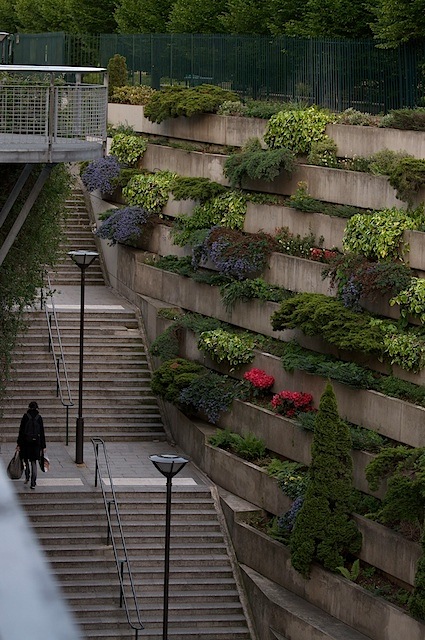
Parisians live in apartments with fewer square metres than the average American. We moved from a house of 2,500 square feet to a 900 square foot apartment. While there’s no room for all of our books, it is considered relatively roomy by Parisian standards. And we immediately have a more expansive life here than when we lived in a larger house. We can walk anywhere in the city and join friends in restaurants that are open to the street, or to any one of the theaters you find every few blocks or any of the world-class museums to be found within walking distance. Imagine, a troupe of world-class Sufi dancers from Syria performing two blocks from your apartment.
But “home” brings me to another subject: household appliances. Americans win that one hands down. We cannot figure out why a European Maytag washing machine takes several hours for a load of washing and several hours for a drying cycle and is noisier than the jets coming in and out of LAX. It’s a mystery. But Americans are better at manufacturing machines.
Aphrodite (beauty, morphos, shapeliness, style, love)
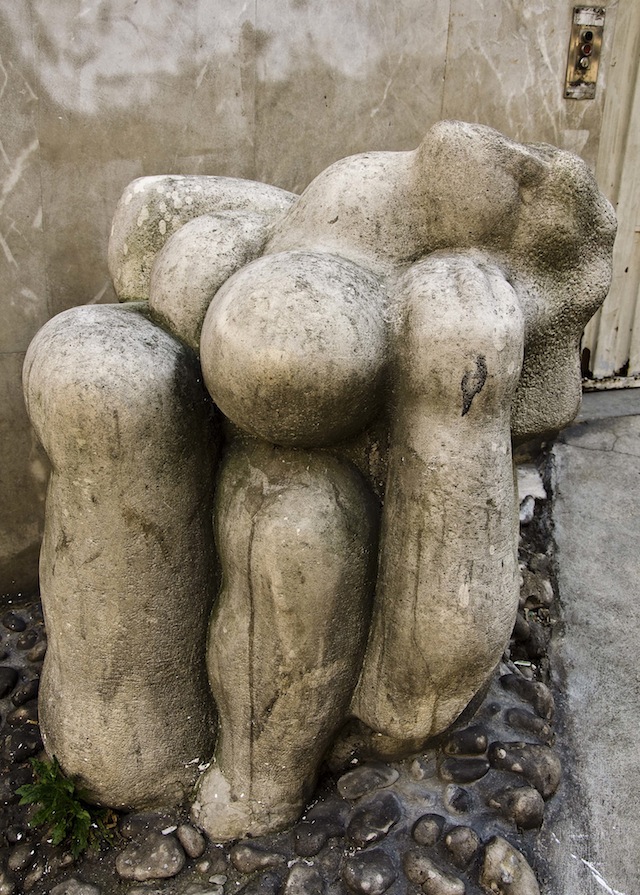
Paris is the center of fashion, so fashion is in Parisians’ genes. What is striking, in contrast to the outlandish styles you see on the fashion runways, is how French elegance combines three things: fine material, simplicity of design and understated refinement. And it seems that mini-skirts never go out of style here, they’re just accessorized with leggings or dark stockings in the winter.
And shapeliness? It’s startling how few fat Parisians you see. This is due, we think, to the nourishing diet, and to the ease of walking in Paris.
The French seem to have built-in radar for temperance and restraint in standards of beauty. You rarely see huge artificial breasts, bad face-lifts, over-bleached hair, sloppy gym clothes in the street and men who dress like boys in shorts and T-shirts—again, elegance seems to include the notion of measure and appropriateness here.
And love? Aside from food, it’s the national religion.
Demeter (food, cooking, nourishment, health)
No one who’s ever spent three days in France forgets the food. The bread! The cheese! The chocolate! The artistry and deliciousness of the cooking!
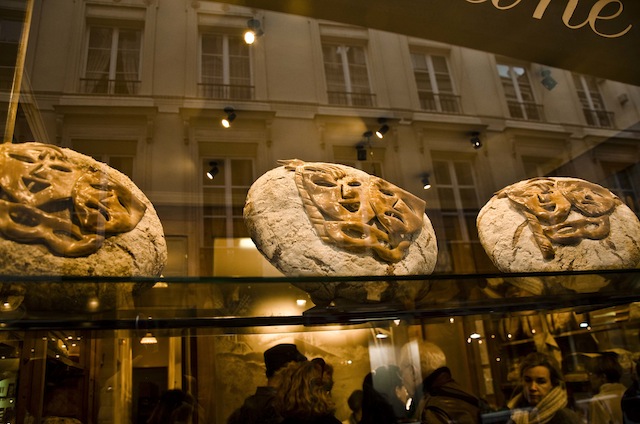 Poilâne bakery, the world's best
Poilâne bakery, the world's best
But let me just mention what the French lack: Whole Foods. There is no market like Whole Foods in Paris. I miss the American spicy salmon and California guacamole they sell. And though the French make a better almond butter, they can’t approach American peanut butter.
Then there’s health care. Our health insurance payment here is equivalent to our old Anthem Blue Shield, but it pays for all medicine, all doctor visits, and a doctor’s visit means the doctor comes to your house if need be. But we wouldn’t want any such socialism in our country, would we? Well, maybe if we’d experienced French health care, we might.
Ares (goods, shopping, purchases, travel, war, practical community protection--such as firemen and policemen)
In spite of my fondness for Whole Foods, it is so soulful to walk to the boulangerie to buy bread freshly baked within the hour, cheese from a fromager where every clerk knows the history of fifty different kinds of cheese and what bread or wine would go best with it. And if you’re a chocolate kind of person, you can buy that dark chocolate and carry it out in a turquoise bag that is more beautiful than a bag from Tiffany’s.
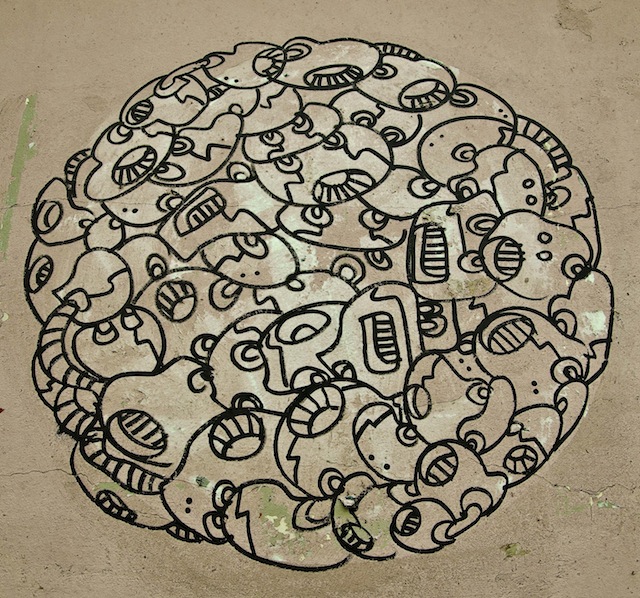
And the public transportation? It makes us weep with gratitude. Though most of the time we can walk to just about anywhere in the city (Paris is only 41 square miles, smaller than San Francisco), when it’s raining or very late, we can hop on a Métro and reach any distant destination in the city within 40 minutes at the most. After driving for hours at a time to get to a destination in Los Angeles, this human scale, of buildings mostly not much taller than five stories, of restaurants and shops mixed in with residential apartments, of great public transport, everything feels intimate here. And that has a relaxing, pleasurable effect on the psyche.
As far as protective services, my hairdresser in Los Angeles, who was from Paris, told me that after experiences like being occupied by the Germans in World War II, the French will not put up with aggressive local policemen. He said we’d get to know the police in our arrondissement, and run into them at our local cafés, and get to know them by name. And that compared with American policemen, they’re much friendlier, and less confrontational.
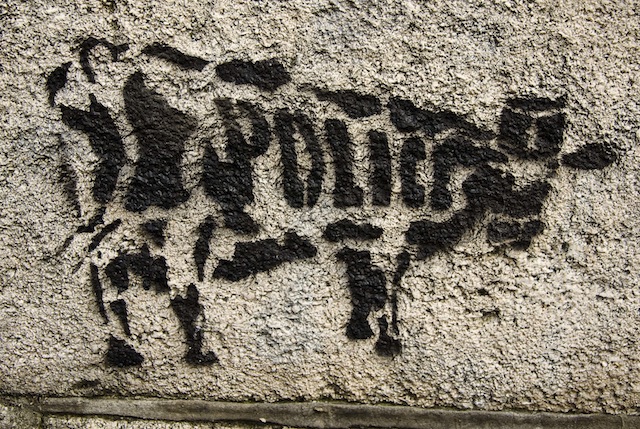
We experienced this when Eric, a policeman, was called to our building. He was a blond young man on a bicycle who seemed about as threatening as the pre-med student in your dorm in college. (But that’s another story.)
Apollo (performance, enjoyment, celebration)
Okay, here’s a story from 2009. Richard and I went to see Martin Scorsese’s film about the Rolling Stones, “Shine a Light.” It was in one of the theaters in what used to be the former public market, Les Halles, a rather Dionysian part of town near the rue St. Denis, where all the hookers hang out. The theater was full. We had good seats in the center of a central row. Now, no one goes to see a film about the Rolling Stones unless he or she likes rock ’n’ roll, and has some attraction to the Dionysian brand that the Stones have been giving us since the ‘60s.
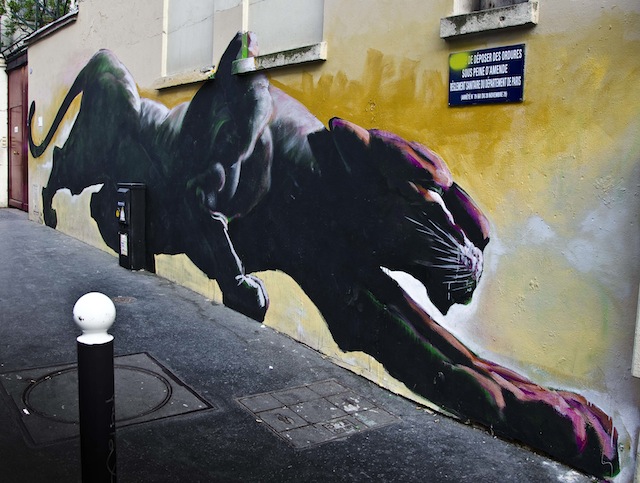
The film was terrific. One great song after another by the greatest rock band in the world (And if you disagree, you’re just wrong.) We could hardly sit in our seats we were so ecstatic. Richard was once a disc jockey in the San Francisco Bay area, and we both came of age with the great rock bands of the ‘60s. It was crazy to be listening to this music and sitting down. So we moved in our seats. How could you not?
But we slowly became aware of the oddest phenomenon. Everyone around us seemed rapt. No one was leaving the theater. But everyone sat, not moving, hands in their laps, like good children waiting to be allowed to eat. No one around us even moved their heads slightly in time to the music. We wondered if we’d hear people saying afterwards that they hadn’t liked the film or the music. But no, in the lobby, we heard low murmurs of approval in French in every direction. We stood by the exit door and listened. The very thing that makes it so pleasant to be in a public space with the French, their decorous restraint, seemed lunatic while listening to the Rolling Stones.
We came away with two impressions: that Americans with their impulsive exuberance might just know how to let loose better than the French, at least in public. And this is why great rock ‘n’ roll has come from England and the United States and not from France. It’s just not the gift of the French.
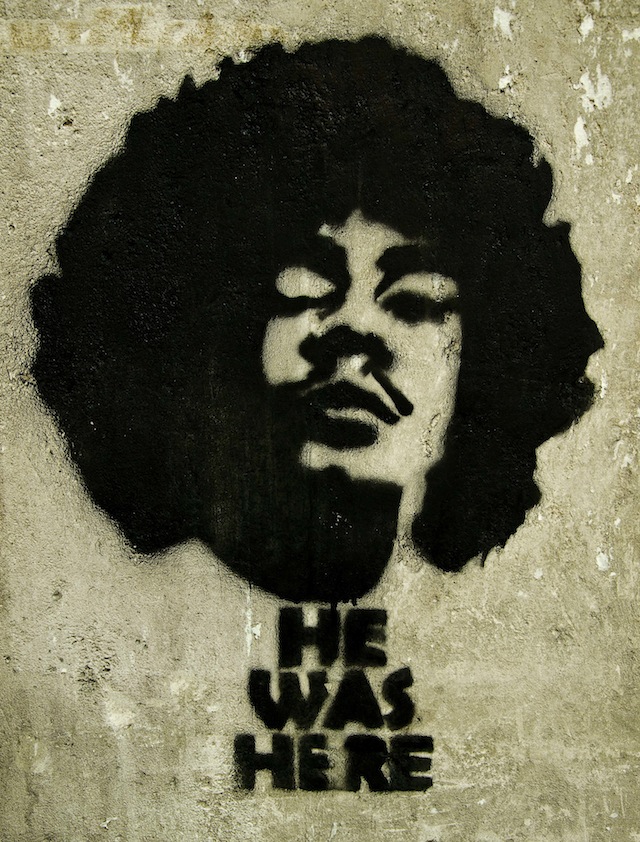
Zeus (generosity, gift-giving, blessing)
The uninhibited nature of Americans makes it easier for them/us to express generosity. Or so it seems to us at this point. Though, as we get to know more French people, who knows what we’ll find? The French, we are told, are notorious for their initial reserve—smiles are earned, not given freely as they are in the United States. But, we are also told, they are warm life-long friends once you break through that reserve. We’ll keep you informed.



Reader Comments (19)
My thoughts after reading you latest post:
Drawing on toilet paper makes wonderful art-frame it and keep it for years! Can I send you a case of soft toilet paper?
It is no wonder you choose the street you live on-creative people from the past decades and more to come..you and Richard.
Long live rock'n'roll!
XO Anner
Love it! I've been teaching comparison-contrast essays to General Composition (i.e., Writing for the Academically Disavowed) students, and this was MUCH more interesting to read as opposed to "Cars and Trucks", "My Boyfriend and My Ex-Boyfriend", or the like. MercI! Tres drole.
Most exquisite photo of Kaaren I've ever seen! Kudos Richard!!
Kaaren and Richard: Amazing evocations in sights and sounds and smells, of course, of that gem, Paris. Here's the third part of a nine-part poem I wrote while there in December of 2002 with wife and daughter... noting the elevated quality of TV subject matter (though not always!)...
_________________
Only in Paris could a quiz-show question on TV be
“How many sets of wings on the Seraphim?”
Or the twinkly little old lady I talked to coming down the
steps from the Sacre Coeur cathedral say that
writers and poets bring people new
perceptions and visions of life as she repulsed an
African bracelet salesman by saying “Nyet!” and we
descended the stairs to the sounds of an
ancient carousel tall and light-studded and calliope-jaunty in the
Montmartre dusk
In the Salvador Dali museum with its
black walls and his deep dramatic voice over the
PA system rolling his “r’s” extravagantly
among the phantasmagoric bronzes and splatter-delicate lithographs
of bearded anchorites hobbling out of blotch red cloud or
squirming lovers holding radiant heads in a state of
Catholic ecstasy on the back of a cloud horse
The Eiffel Tower has turned to gold from our faraway window
like the Seraphim with their three sets of wings
(the correct answer)
presiding over Paris
And various angels with various wings float in the
fog blowing various Renaissance trumpets
as buses and Pugeots grind along the streets down below
and Rilke says “So this is where people come to live –
I would have thought it is a city to die in”
While Nijinsky whom I’ll visit tomorrow God willing in the
Montmartre cemetery of the Sacred Heart
leaps higher in the air than ever in his grave
and actually stays there
________________________________
(from Through Rose Colored Glasses, The Ecstatic Exchange, 2008)
Gorgeous picture of you Kaaren! I'm enjoying Paris vicariously through your words. And hang in there on the friendship front. It'll happen.
Because I've been doing the same thing while in New Zealand (making comparisons with life in America), this post jumped out at me. Certainly, Paris has the best street art and graffiti that I've seen anywhere. And a discerning eye to notice and record it. Jane
Anner,
And that would make particularly good bathroom art. It's so nice of you to offer to send some t.p.--maybe you could throw in some Kleenex too?
We love this street. There ought to be a plaque at #14 for Carolyn Kizer, American poet, one day.
We love our rock 'n' roll, don't we?
Love,
Kaaren & Richard
Hi Kate,
Thank you! But I do think it's easier to write a comparison-contrast essay when you've had a bit more life experience than one has in high school. And with your help, these students will get academically savvier. Keep up the good work!
XO,
Kaaren & RIchard
Suki,
I think the secret to good photos is to take them when people are relaxed. And it's easy to be relaxed when you're with Richard, and in Paris.
Love,
Kaaren
Dear Daniel,
I'll respond to the longer poem in e-mail (thank you!), but I wanted to comment on your Rilke quote.
Rilke had a hard time financially in Paris, but it provided the experience he wrote about in his only novel. Working as Rodin's secretary taught him how to objectively observe things (like that panther in the Jardin des Plantes), which transformed his poetry. And modernism, especially the work of Paul Cezanne, had a strong influence on him in Paris.
Later, he escaped poverty by accepting the generosity of various wealthy patrons, some of whom were his lovers. He wrote the Duino Elegies at the Countess Marie of Thurn and Taxis's Castle Duino, near Trieste, and later, found a home in the Chateau de Muzot in Valais, which his patron Werner Reinhard bought and renovated so he could live there rent-free. There he wrote Sonnets to Orpheus.
So Rilke DID at last find the right conditions, the right place, to die. And they were provided by wealthy patrons.
Yes, TV is better in France, and yes, "but not always." You, too, have evoked many sights and sounds of Paris. You've reminded us of the Dali museum, and made us want to return.
Thank you!
Kaaren & Richard
Hi Ebba,
The photo is good because Richard took it. Thank you for your appreciation. And for your encouragement. We look forward to friendships with the French (and have some already).
I thought of you yesterday while watching Kate and William. Oh, you Brits: today's post is on that very subject.
Hope to see you in Paris or England before too long.
XOXO,
Kaaren and Richard
Hi Janine,
Thank you! You must be getting ready to leave New Zealand. Will you miss it? I want to hear your full comparison/contrast list of the differences between New Zealand and the U.S.
I had the same thought the other day looking at photos of graffiti in Croatia. I've never been anywhere where the graffiti is better than Paris. I think it's part of the spirit of place here: art rules, and even street art is approached as serious art. In fact, I think it IS serious art.
I'll call you when you're back in the U.S.
Love,
Kaaren and Richard
Fabulous post! So wish I were there. I am overwhelmed with work. No time at the moment to organize a trip to Paris. But I will get to that!
The anthology I just edited is coming out now.
XXXX
S
Ah Kaaren: I remember when I ran into you by "chance" behind the desk at the Boston bookstore where you worked, and you took us (my then wife and I) to your apartment briefly (a lovely dark place in afternoon sunlight), and you said you were reading Rilke, or there was a book of his open on your table, and we talked about the Duino Elegies a little, and I spied a low typewriter (you sat cross-legged on the floor?) with a paper in the platen with words on it (A TYPEWRITER!), and I wanted to read it, a poem you said, and I didn't know you wrote poems, but you said something about it not being ready, or perhaps you were shy... I'm not sure which... So you know your Rilke. Have you seen him lately, at one of those outdoor cafes, a little brooding and aloof? (Rodin finally had to fire him, I seem to remember, for making some decisions on his own Rodin wasn't consulted about... What a life!)
Kaaren:
I couldn't help noticing the last post by Susan Griffin, and am amazed. Just this morning I read a little poem from my book, Holiday from the Perfect Crime, to a gathering that gets together every Saturday, and the long note with it, which is a Wikipedia citation from Susan Griffin! Same person? Here's the poem and note (and I would love to know which book of hers it is from: A Chorus of Stones?) (The poem is slight, but I can't read the note out loud without getting emotional...) (Please let me know which book it is from, if not A Chorus of Stones... )
Daniel: According to Beliefnet, this is the provenance of the piece/poem, then in essay form:
"A longer version of this essay, 'To Love the Marigold,' appeared in 'The Impossible Will Take a Little While: A Citizen's Guide to Hope in a Time of Fear', edited by Paul Rogat Loeb which was named the #3 political book of Fall 2004 by the History Channel and the American Book Association. The essay also appeared earlier in Utne Reader. Susan Griffin's newest book is The Book of the Courtesans (Broadway Books, 2002)."
It is our hope that Susan will be leading a courtesans' tour here in Paris sooner than latter. Anyone who can help pull that off, get it touch with us here, and we'll pass on any leads to Susan.
--Love, Kaaren
Read more: http://www.beliefnet.com/Inspiration/2005/02/Can-Imagination-Save-Us.aspx#ixzz1L4GfW2Kx
POEM FOR ROBERT DESNOS
Robert Desnos I’ve recently become more
interested in you and your poems
I wonder if I reached far enough into my sleep
I could pull you out and we could
sit here and have a nice chat?
6/5/2005
____________________________________________________
(Robert Desnos [1900, Paris ¬ 1945, Terezin Internment Camp, as a political prisoner], French Surrealist poet known for his sleep-trance poetry dictations. From Wikipedia: Susan Griffin relates a story that exemplifies Desnos’ surrealist spirit: “One day Desnos and others were taken away from their barracks. The prisoners rode on the back of a flatbed truck; they knew the truck was going to the gas chamber; no one spoke. Soon they arrived and the guards ordered them off the truck. When they began to move toward the gas chamber, suddenly Desnos jumped out of line and grabbed the hand of the woman in front of him. He was animated and he began to read her palm. The forecast was good: a long life, many grandchildren, abundant joy. A person nearby offered his palm to Desnos. Here, too, Desnos foresaw a long life filled with happiness and success. The other prisoners came to life, eagerly thrusting their palms toward Desnos and, in each case, he foresaw long and joyous lives. The guards became visibly disoriented. Minutes before they were on a routine mission the outcome of which seemed inevitable, but now they became tentative in their movements. Desnos was so effective in creating a new reality that the guards were unable to go through with the executions. They ordered the prisoners back onto the truck and took them back to the barracks. Desnos never was executed. Through the power of imagination, he saved his own life and the lives of others.”)
Dear Daniel,
I remember that well. You came up to the counter of the Harvard Bookstore. You were recycling a box of books. We were amazed to recognize each other, And then when I got off work, you introduced me to your (then) wife, and we all walked to my apartment on Maple Ave. We talked and talked. That was a difficult time in my life, when I was being threatened by an ex-boyfriend, and living in hiding. What saved my life that year and a half was reading Rilke, Nietzsche and Lou Andreas-Salome. Also Yeats and Pound. And hearing Robert Bly at Radcliffe. I was writing poems, but (you're right), had stage fright at that point in my life, and was not reading them in public. I do see Rilke but mostly in my imagination. I imagine he's one of your touchstone poets too, yes? Isn't this fascinating, how our lives weave in and out of contact. Now, my fondest wish is to be back in touch with Malika, whose imagination knew no bounds when I knew her in Berkeley.
I love your poem and I love the story Susan Griffin tells about Robert Desnos. That IS the power of imagination. It reminds me of a story I read recently in How to Live; A Life of Montaigne, by Sarah Bakewell. She describes Montaigne's trusting openness, to the extent that when terrible wars were raging near his castle between Protestants and Catholics, he refused to bar the doors. At one point marauding soldiers came into his home intending destruction, but simply on seeing the openness and friendliness in Montaigne's face, dropped their weapons, and he welcomed the soldiers with hospitality. The power of the spirit in one human being!
Love,
Kaaren
Dear Susan,
Thank you so much! These posts are to keep reminding you of this world "beyond terror" where life is deliciously civilized. I hope the tour shapes up and that you are here in Paris this summer.
In the meantime, good luck on sales of your anthology, Transforming Terror.
http://berkeleyarts.org/
XOXO,
Kaaren and Richard
Dear Kaaren,
My head is swirling (in a good way)... what fascinating comparisons! And, Kaaren, (and Richard through your wonderful images), you have articulated so many of the reasons that I love the French, and am drawn in by French culture: bookstores...a respect for quiet... cultivated public discourse...deep passion...wine, bread & chocolate!
Thank you for sharing these insights. (I would have loved to see you and Richard wiggling in your seats during the Stones film. :))
xoxo,
dawna
p.s. I've been told that American "soft" T.P. is actually not as ecological as the "sandpaper" type. So perhaps the French are willing to endure a bit of daily suffering for a noble purpose. :)
Dear Dawna,
I think of this city as tailor-made for you. You would be so at home here. Those are all the same reasons we love Paris.
When I picture us in that theater watching "Shine a Light," I imagine a couple of rows of American family and friends, and how that section of the theater would be like the high seas, moving and roiling, while the rest of the audience would resemble dry land, immobile.
This is the first I've heard about "sandpaper" t.p. being more ecologically healthy. In that case, I accept it. (And we did exaggerate a wee bit.)
Thank you for your appreciation, Dawna.
Love,
Kaaren & Richard